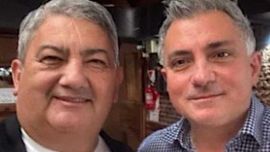Looks can deceive when it comes to Victoria Villarruel, La Libertad Avanza’s vice-presidential candidate. Impeccably prepared, the discourse of this lawyer of military origins and her almost angelical image contrasts with the harsher style of her political leader, Javier Milei.
Even if unthinkable just two years ago, the chances of the libertarian ticket reaching the Presidency have turned Villarruel into a leading protagonist of public affairs. Ever since she was elected as a national deputy, her stance on state terrorism during the era of Argentina’s 1976-1983 military dictatorship has made headlines. Pushed even further to the front of public debate, her views have reopened the human rights debate, thus rocking a foundation stone of Argentine democracy in its 40th year.
Perfil sought comment from Villarruel and her entourage for this article without response. La Libertad Avanza spokespersons answered that they would not be making any statements.
Villarruel, 48, has dedicated her career to a combat against the generalised consensus regarding the political violence of the 1970s and the crimes against humanity committed under the military junta. Her track record extends from visiting genocidal generals in prison (including former junta chief Jorge Videla) and retaining "very close" ties to many other military ex-officers currently on trial, her entourage affirms, to representing those who died in guerrilla attacks.
Yet the militant who calls for "a complete memory" to be heard has remained absolutely hermetic, basing herself on an ambivalent stance which has earned her accusations and criticisms from all sides.
It has also served as a successful political platform which could take her to the Casa Rosada at the climax of this year’s presidential elections.
‘The other victims’
Villarruel’s main merit was to construct her public figure around the attacks of the armed groupings of the 1970s, calling for "complete memory." Since then, she has presented herself as a defence lawyer for the "other victims" of political violence while distancing herself from the more socially repudiated genocides.
Her appeal to her community is based on her self-definition as a "relative of the victims of terrorism." Villarruel has stepped into this historic vacuum, assembling her own "list of victims" and seeking to redefine the concept of human rights with an eye to the Plaza de Mayo organisations and the figure of 30,000 missing.
"The scale of armed terrorist action makes denying a war incomprehensible," she maintained in a 2016 interview with Eduardo Feinmann, vindicating the “two demons” theory.
"I’d like to see a really independent judiciary putting those people on trial just as they put the state agents who violated human rights on trial. I’d like to see some equality and not feel that some people are second-class citizens," she added.
Villarruel’s strategy consists of maintaining a certain ambivalence about the crimes of the dictatorship (including baby-snatching) and instead shifting the conversation towards “the victims of terrorism” of organisations like the Montoneros and the ERP in the 1970s, whose violence she skilfully places at the same level as the dictatorship’s systematic plan of the slaying and disappearance of persons.
Denialism, ambiguity, political success
Villarruel, the heiress of a military family, has never openly denied the crimes of the military dictatorship. She has no time for the accusations against her, repeating that they are highly “highly unfair criticisms.”
“They tag me as a denialist who defends genocides. I’m not and never was a lawyer for anybody in uniform accused of crimes against humanity,” she told La Nación’s José del Río in an interview.
She recently maintained that those accusing her of denialism "are the relatives of terrorists," references to government officials Horacio Pietragalla and Victoria Montenegro.
Even if the libertarian candidate has not defendeded anybody in uniform, the discourse of her militancy has been a long and winding road. When the direct questions crop up, Villarruel is ambiguous.
Last month she questioned human rights policies in dialogue with the A24 television news channel, maintaining that what was once the ESMA Navy Mechanics School functions as “the museum of amnesia.”
Pushed on the work of the Madres de Plaza de Mayo and Abuelas de Plaza de Mayo human rights groups, she always shifts the focus, criticising them for "not repudiating terrorism at any time" and cloaking the restoration of identity under suspicion. Previous comments have sought to question the work of the NGOs, though she has not provided evidence: "There are grandchildren who are described as having been recovered but nevertheless were with their families. The web page of the Abuelas de Plaza de Mayo says as much. I believe that they owe society an explanation."
Tracing the statements of her Víctimas del Terrorismo de Argentina (Celtyv) association, it is hard to find direct references to the military ex-officers on trials. She insists on describing in public the armed organisations as terrorists with the focus of her work on the “innocent victims” (thus implying that the other victims were not innocent).
Although that public stance has paid dividends, it has been at the price of a certain distance from the defence lawyers of convicted military officers, many of whom have dubbed her as an opportunist for moderating her discourse or hiding her true thinking about crimes against humanity.
Villarruel’s relationships
Although she hides her proximity to the convicted ex-officers, increasingly more details are emerging about the maximum confidence some of them had in her.
On the last day of August, Guadalupe Godoy, a plaintiff lawyer in the trials of crimes against humanity revealed to the La Retaguardia news portal that the notes of late dictatorship-era torturer and killer Miguel Etchecolatz revealed Villarruel appearing as one of his contacts.
On July 28 ex-colonel Pedro Rafael Mercado, the husband of Cecilia Pando, published a note on Facebook referring to when he first met Villarruel at a dinner in 2006: “Always accused of being a fascist, for the first time in my life the tone of the conversations that night placed me slightly to the left of the couple inviting me.”
Mercado also related that one of the activities organised by Jóvenes por la Verdad, a group in which Villarruel participated, was to coordinate “visits to lieutenant-general Jorge Rafael Videla, while under house arrest.” Mercado further remarked that it was thanks to the candidate that he got to know the ex-dictator before his death.
The former Carapintada Army mutineer is the only high-profile person to make public statements about Villarruel but other militants of “complete memory” organisations tell similar stories.
“She used to take young people to the meetings with Videla so that they could listen and learn. He also helped out, I understand, with a quota to maintain the group and which she passed on every month,” somebody who worked with her in those years told Perfil.
A man who did not accompany Villarruel directly in any militant grouping but who knew her recalls that she used to visit her convicted father in a Tucumán prison.
“She always moved with people of her kind and there are things which will never be understood. That’s why the old people love her so much because she visited them and told them that what they had done was fine, speaking to them of a war and [one might say] indoctrinating many people in that thinking,” he told Perfil.
Two demons theory
In a document of the Unión de Promociones del 2005 organisation, in which Villarruel also participated, the “hardliner” tone of the earlier years can be seen more clearly.
After arguing that the “national drama” had begun with the policies of 1983-1989 Radical president Raúl Alfonsín, Villarruel writes: “There is a crime according to the prism through which you look. It is legal to kill in a war but not in peace.”
With the passage of the years, the national deputy has attenuated her discourse while also relativising the concept of “war” while trying to tone down the dictatorship’s state terrorism. In an interview with La Nación in 2010, when asked if she thought that “state terrorism was the same as any other kind of terrorism,” she replied: “The expression of state terrorism is not only unfortunate but also confusing.”
Perfil tried to communicate with Victoria Villarruel and Javier Milei for this article without response.
related news
by Cecilia Degl'Innocenti & Giselle Leclerq, Perfil






















Comments